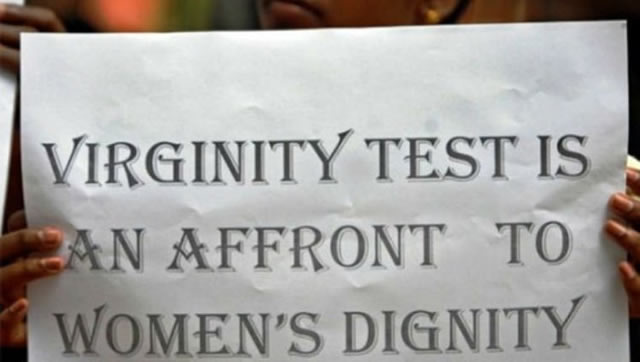Virginity: Violence, double standards


The best way to end violence against women is to prevent it from happening in the first place by tackling its root and structural causes
Lazarus Sauti
“Women, unlike men, have to worry about their virginity. They are taught that their virginity is valuable, even a commodity. Remember the issue of mombe yechimanda; virginity is commercialised, commodified.”A Harare man, Shepherd Musekiwa, whipped his wife as punishment for falsely claiming that she was a virgin before he married her. He, discovered that she was not a virgin during their honeymoon.
The matter was heard in the Civil Court recently after Shepherd Musekiwa’s wife, Patricia, approached the court for a protection order against her husband.
“The main problem is that she lied to me that she was a virgin before I married her, only to find out that she was not after the wedding,” Shepherd told magistrate Barbra Maketo.
He added, “She used to deny me sex before I married her saying she was saving herself for marriage, but she was lying.”
Patricia said she is suffering because her husband had also resorted to “manufacturing” allegations against her in a bid to divorce her and bring in his girlfriend.
“I am suffering in my marriage. My husband bought a whip which he uses to assault me and I have scars on my back as proof of his abuse.
“He is chasing me out of our matrimonial house,” she said, adding that Shepherd calls her all sorts of derogatory names as well as labels her a prostitute.
Daphne Jena, a gender activist, says Shepherd has no right whatsoever to beat his wife as doing so only entrenches negative expectations that society has on women.
She added that although virginity may seem like just a tradition, it is problematic as well as harmful.
“The issue of virginity as a sign of purity is tricky as well as hurtful. In countries like India and most African countries, women are violated through virginity testing as well as genital mutilation because societies want to preserve their virginity as well as enhance male sexuality,” Jena said.
She also noted that virginity is sexist.
“Women, unlike men, have to worry about their virginity. They are taught that their virginity is valuable, even a commodity. Remember the issue of mombe yechimanda; virginity is commercialised, commodified,” she said.
By calling her wife all sorts of offensive names, asserts Jena, Shepherd is crushing Patricia’s soul and dignity.
“The fact that Shepherd labels Patricia a prostitute proves that the issue of virginity not only contributes to slut-shaming, but has social consequences,” she said.
Jena also says virginity served as the Medieval form of a paternity test, a fact supported by Erin McKelle in an article “5 Reasons Why We Need To Ditch the Concept of Virginity for Good”.
Explaining how the issue of virginity crept into society, McKelle noted: “Since women were (and sometimes still are) considered property, when they got married, they were passed on to their husbands from their contraception was unattainable, so it was important for women to remain virgins for their husbands to ensure the purity of his bloodline.”
Human rights researcher Simbarashe Namusi added that beating a woman because she lied about her virginity shows lack of respect for women.
“Men, as major perpetrators of gender violence, should respect women as they should also enjoy the right to human dignity provided in Section 51 of the Constitution.
“Instead of bashing them over silly issues, men should respect them,” he said.
Namusi also blames the society for perpetrating gender violence.
“In our society, female virginity is valuable, but a man’s is not really worth anything. Boys are saluted and socially rewarded for having sex whilst girls are publicly shamed. This is unadulterated sexual double standards,” he added.
Violet Nkathazo, a gender activist, concurs.
“Women are made to suffer because of virginity which is linked with purity. This purity, sadly, is demanded from women only,” she said.
Nkathazo added that instead of reinforcing patriarchal norms about sexuality and women’s worth, society needs a paradigm shift.
“In this modern age, both girls and boys should be encouraged not to engage in premarital sex. They should also be encouraged to shun all forms of violence,” she said.
Media practitioner Bornwell Matowa said violence against women is rooted in gender-based discrimination as well as social norms and gender stereotypes that maintain such violence.
“Accordingly, the best way to end violence against women is to prevent it from happening in the first place by tackling its root and structural causes.
“Significantly, prevention should start early in life, by educating and working with the youth, especially boys in propagating respectful relationships and gender equality,” he said.
Matowa added that prevention of all forms of violence against girls and women enables women to enjoy their rights as they are enshrined in Section 80 of the Constitution.
Freelance writer Christine Mwaturura, in a piece titled, “Female virginity is far too overvalued”, acknowledged that women are abused because of virginity issues, and added that “they should be liberated from the bondage of the narrative that has suppressed our sexuality so that each woman can express her sexuality however she sees fit, whether that means safely engaging in sex or abstaining.”
Traditional leader Zefa Mutauto condemns men who abuse their partners because of issues such as virginity. He, thus, urged couples to desist from domestic violence.
“Violence is never the answer, but a catalyst of problems. Instead of harming each other, couples should live peacefully and find other channels such as counselling to solve their problems,” he summed up.
The writer is based in Harare, and he writes in his own capacity.










Comments